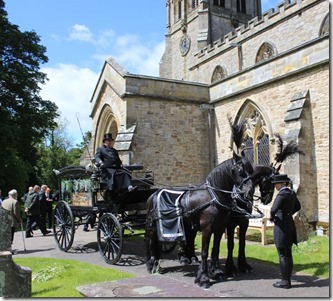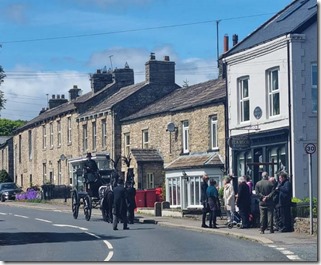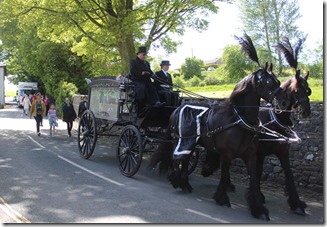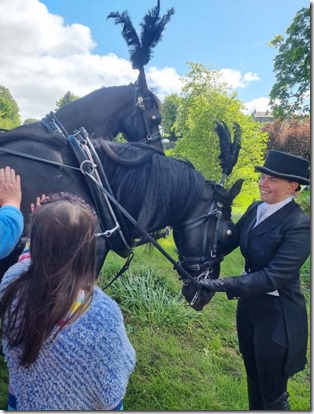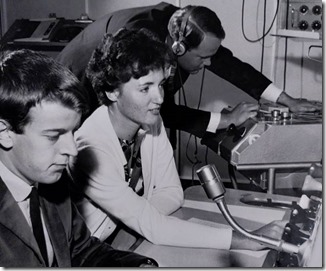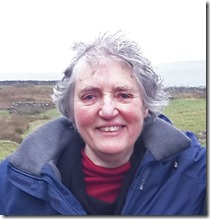Paddy’s funeral, following her death on April 26th 2022, was at St Andrew’s Church, Aysgarth, on May 27th. One reason it will be remembered is because of the splendid black horses with plumes which pulled the hearse.
Her daughter Ro explained beforehand: ‘We are not sure if Paddy was joking or not (one could never be sure!) but she did mention this more than once to me, and on a separate occasion to my sister-in-law Nicola, that she would like her final journey to be in a carriage drawn by “black horses with plumes”. This has been arranged, and the horses will be setting off from Hamiltons Tea Room, where Steve, Sandra and some of the regulars will raise a cup of hot chocolate with marshmallows to her.’
Photos: The horse-drawn hearse at the church; at Hamiltons in Aysgarth; descending Chapel Bank followed by the family and friends; Paddy’s granddaughter Eleanor stroking one of the horses.
Ro gave the following tribute to her mother at the funeral:
Africa
Paddy was born on July 30th 1940 in Lindi, Tanganyka Territory (present day Tanzania).
She wrote of her earliest memories: ’I used to play with Nganya, my Ayah’s daughter, but don’t remember much about her. Ma had hoped I’d teach her European ways and was disappointed when she discovered us sitting on our haunches, swaying and clapping and singing some African chant’.
Many years later, when I took her to the Flying Boat Museum in Foynes, S W Ireland, the museum staff were very excited to meet someone who had travelled on one and she was treated to an Irish Coffee – although all she could remember [of the flight] was being told off by her mother for pulling the hair of the lady in the seat in front of them!
In 1947 the family returned to East Africa, and some of Paddy’s fondest memories are from that time. Here are two excerpts from her written memories of this time:
‘We returned to Africa when I was seven and for a few months my mother taught me with materials supplied from Dar es Salaam as a correspondence course. I really loved this and would spend my break times climbing trees, examining the abundant insect life or just lying on my back revelling in the sunshine, the bird sounds and the work songs of the natives. There were no other white children, so my friends were African girls, who taught me some of their customs and dances. My parents gave me a little dachshund puppy, which was later run over by one of the lorries from the ill-fated Groundnut Scheme and I also had a tame monkey, which went everywhere with me.
‘I travelled down to South Africa for my next school, where I boarded. I found out later that I was in the same form as Sue McGregor (we compared notes when we met at the BBC). I was very happy there and made many friends. At weekends I went to stay with a delightful couple who had a house in the middle of a vineyard. She was the sister of a famous singer, Keith Faulkener, and had a superb voice herself. She trained the church choir and made me a member, along with two other girls. This wonderful woman would gather a whole group of children together at weekends and take them on exciting excursions to various beauty spots, to the seaside, to the top of Table Mountain by cable car and many other places I cannot remember. The school also arranged trips to the cinema and to the ballet, but it was after the ballet trip that the house mistress took me into her sitting room and told me very gently that my father had died and that I would have to leave the school’.
As her mother wound up her father’s business, farm and estate, Paddy attended a government boarding school for six months. She was very happy there and made many friends.
England
She and her brother Bernard travelled back to England with her mother and their lives became very different: ‘After a long sea voyage, we arrived in a murky Britain to find ourselves in the middle of a dock strike, so our trunks couldn’t be off-loaded. My mother’s brother hadn’t bothered to come and meet us, so it was a miserable introduction to the country that would henceforth be my home’. They travelled to Rye, where she was enrolled almost immediately at the Primary School, where there was ‘a non-stop regime of General Knowledge, Intelligence, Mathematics, English Language and other tests, all of which would feature in the Eleven Plus exam’.
She missed Africa terribly, and when she sang Jerusalem at school, she would change the words to ‘England’s green unpleasant land’.Since her father had died overseas, her mother was not entitled to a widow’s pension and was too proud to ask for help. There was enough money to buy a small bungalow in Camber, which was ‘in an area where she felt we’d be safe when she left us to our own devices when she went out to work. She had a bicycle with a child’s seat and cycled in all weathers to the golf club, walked across the links and banged the gong (an old artillery shell case) for Mr. Doughty the ferryman, who would row passengers across in his little dinghy for (I think) sixpence. She worked in the office of a concrete works and would keep tabs on us via a daily lunch time telephone call.
‘We spent a lot of our holidays in the (forbidden) Amusement Arcade, trying our luck with the penny-in-the-slot machines and the crane that never quite managed to pick up the goods. Most of the rest of our time was spent on the beach or in the sea’.
She would also climb around the walls of Camber Castle with other children and was often quite daring in these exploits. At home she had a strong preference for Meccano and the Hornby train set and had no interest in dolls. She also liked taking things apart to see how they worked.
Despite the major trauma of losing both her father and the country she loved, Paddy came ninth in the whole county for her Eleven Plus and went on to Rye Grammar School. However (in her own words):’The Grammar School was a let –down. We had all kinds of exciting subjects and sports and games, but I was aware right from the start that girls were not considered academically worth encouraging. We were told that only one girl would go to university for every 50 boys and on one notable occasion the Chemistry Master told us that the girls must be quiet because the boys couldn’t concentrate’.
Things improved as she went through school, and had an inspirational art teacher, Marjorie May. She passed A level Art and would have liked to have gone to Art College, but her mother was advised that Art Colleges were "dens of vice and iniquity", so she went to secretarial college instead.
In 1959 she joined the BBC as a secretary and worked in various departments before becoming a production secretary in Radio Drama in 1961 and a Studio Manager in 1964. She married a fellow Studio Manager [Roger Charlton] in 1966 and left the BBC to become a full-time mother when Ro(semary) and Alan were born in 1968 and 1970.
Paddy was very capable and became very adept at DIY. One of my earliest memories is of Paddy high up on a ladder removing paint from the eaves with the terrifying paraffin blow torch, with its fierce long flame.
In the mid-1970s, Paddy and Roger moved into a larger house that needed quite a lot of work, most of which they did themselves, including rewiring the whole house. Paddy did most of this when the children were at school and Roger at work. She described herself ‘holding a book in one hand and a wire in the other and working out what to do’, but the task was completed successfully. They also carried out most of the maintenance on the 1965 Morris Minor.
She made many of our clothes using her trusty hand-driven Singer sewing machine and knitted many jumpers.She started an Open University degree in 1982, while raising the family and working part time. While taking a Science Foundation Course she discovered a passion for geology. She graduated in 2000, and then went on to complete a postgraduate diploma. She made some very good friends from on geology field trips and excursions.
Roger was given early retirement in 1992 and they moved up to the Dales two years later. Paddy made the most of her retirement, gardening, learning new skills (upholstery, spinning, scything), and some sailing. She played the viola in the Wensleydale Orchestra, which she and Roger have supported for nearly 30 years. She was able to resume her art studies and joined a ‘laid-back, but highly productive amateur group’ who have now been meeting for 20 years. She was one of ten finalists in the 2014 Oldie Magazine Artist of the Year, for her painting of the Poulnabrone passage tomb in Co. Clare, Ireland. While Paddy was still recovering from a knee replacement, I received a call from her ‘I’m on top of Addlebrough!’
The last few years have brought many challenges, including the death of her brother Bernard in August 2018, followed by Alan’s death just three weeks later after a long illness. I was very fortunate to be visiting in March 2020 and to spend both lockdowns working from Wensleydale. This unexpected additional time together was a precious gift at the time, and even more so now.
‘For a long time I yearned to return to Africa, but the intervening years I would be an alien there. Strangely enough, our move to the Yorkshire have brought such changes to what I still consider to be my country, that Dales has given me the same feeling of contentment as I felt in my early life and I think this is probably due to the fact that the inhabitants in both countries have had to contend with Nature in all its moods and have to deal with all the different natural emergencies on their own’.
